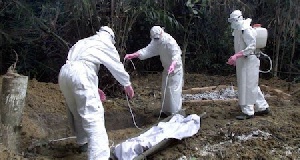An area populated by Liberian Refugees in Ghana’s Central Region has recorded two Ebola-like cases.
Blood samples of the patients who live within the enclave of the Buduburam camp – home to thousands of Liberian refugees for more than two decades – have been sent to the Noguchi Memorial Institute for Medical Research (NMIMR) at the University of Ghana for testing.
They are bleeding from their nostrils and mouths – symptoms of the haemorrhagic fever that has killed more than 1,000 people in Liberia, Guinea and Sierra Leone. Nigeria has also recorded a few cases and deaths.
Adam Nuhu, the Municipal Chief Executive for Kasoa – the town that hosts the community of Liberian refugees – told StarrFMonline.com that health officials in the area stumbled upon the suspected Ebola patients, as they took care of 70 cholera patients – including the two – at a polyclinic in the town.
A cholera outbreak has killed almost 40, out of more than 3,000 people affected by the diarrhoeal disease in the West African country.
The two suspected Ebola patients have been quarantined by health officials, pending test results from the Noguchi Memorial Institute for Medical Research.
Adam, however, could not confirm if they are Ghanaians or Liberians.
The two suspected cases come on the heels of reports that hordes of Ghanaian fishermen, who ferry between home and Liberia, were fleeing back to Ghana, to avert contracting Ebola.
Being one of the hardest hit countries reeling under the festering virus, Liberia is currently giving an experimental serum (zMapp) to Ebola patients in that country, as part of efforts to fight the disease, which the World Health Organization (WHO), has described as the “worst ever” epidemic of its kind.
The WHO endorsed the use of zMapp on Ebola patients on a large scale, after a long ethical debate over the matter. Two Americans who got infected with the deadly fever in Liberia, are recovering after the serum was administered to them more than two weeks ago.
However, a 75-year-old Spanish priest, Miguel Pajares, who also got infected with the disease in Liberia, and was given the experimental serum, died Tuesday.
Ebola is transmitted through direct contact with blood and tissue samples of infected people or animals – apes, fruit bats and antelopes – all delicacies in sub-Saharan Africa. It has a fatality rate between 50 and 90 percent, and kills within days.
General News of Thursday, 14 August 2014
Source: starrfmonline.com













